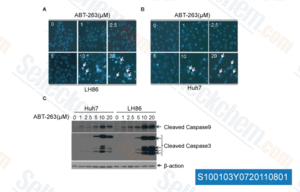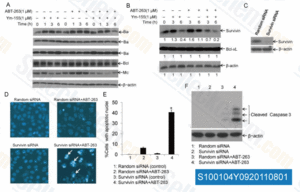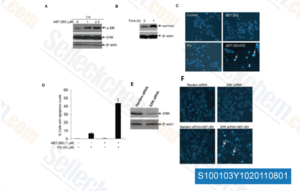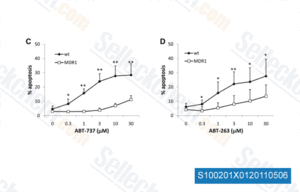|
Toll Free: (877) 796-6397 -- USA and Canada only -- |
Fax: +1-832-582-8590 Orders: +1-832-582-8158 |
Tech Support: +1-832-582-8158 Ext:3 Please provide your Order Number in the email. |
Technical Data
| Formula | C47H55ClF3N5O6S3 |
|||
| Molecular Weight | 974.61 | CAS No. | 923564-51-6 | |
| Solubility (25°C)* | In vitro | DMSO | 100 mg/mL (102.6 mM) | |
| Water | Insoluble | |||
| Ethanol | Insoluble | |||
|
* <1 mg/ml means slightly soluble or insoluble. * Please note that Selleck tests the solubility of all compounds in-house, and the actual solubility may differ slightly from published values. This is normal and is due to slight batch-to-batch variations. * Room temperature shipping (Stability testing shows this product can be shipped without any cooling measures.) |
||||
Preparing Stock Solutions
Biological Activity
| Description | Navitoclax (ABT-263) is a potent inhibitor of Bcl-xL, Bcl-2 and Bcl-w with Ki of ≤ 0.5 nM, ≤1 nM and ≤1 nM in cell-free assays, but binds more weakly to Mcl-1 and A1. Phase 2. | ||||||
|---|---|---|---|---|---|---|---|
| Targets |
|
||||||
| In vitro | ABT-263 is structurally related to ABT-737; it is a disruptor of Bcl-2/Bcl-xL interactions with pro-apoptotic proteins. Overexpression of the prosurvival Bcl-2 family members is commonly associated with tumor maintenance, progression, and chemoresistance. [1] ABT-263 displays the protection afforded by overexpression of Bcl-2 or Bcl-xL with EC50 values of 60 nM and 20 nM, respectively. [1] A wide range of cellular activity is observed with ABT-263 having a 50% growth inhibition (EC50) of 110 nM against the most sensitive line (H146), whereas its activity in the least sensitive line (H82) results in an EC50 at 22 μM. All four cell lines with EC50 values of <400 nM (H146, H889, H1963, and H1417) are also highly sensitive to ABT-737, and the two most resistant lines (H1048 and H82) are similarly resistant to ABT-263. [2] | ||||||
| In vivo | When ABT-263 is administered at 100 mg/kg/day in the H345 xenograft model, significant antitumor efficacy is observed with 80% TGI and 20% of treated tumors indicating at least a 50% reduction in tumor volume. [2] Oral administration of ABT-263 alone causes complete tumor regressions in xenograft models of small-cell lung cancer and acute lymphoblastic leukemia. In xenograft models of aggressive B-cell lymphoma and multiple myeloma where ABT-263 displays modest or no single agent activity, it significantly enhances the efficacy of clinically relevant therapeutic regimens. [2] |
Protocol (from reference)
| Kinase Assay: |
|
|---|---|
| Cell Assay: |
|
| Animal Study: |
|
References
|
Customer Product Validation

-
Data from [PLoS One, 2011, 6, e21980]

-
Data from [PLoS One, 2011, 6, e21980]

-
Data from [PLoS One, 2011, 6, e21980]

-
Data from [Biochem Biophys Res Commun, 2011, 408(2), 344-9]
Selleck's Navitoclax (ABT-263) has been cited by 410 publications
| First-in-class ultralong-target-residence-time p38α inhibitors as a mitosis-targeted therapy for colorectal cancer [ Nat Cancer, 2025, 6(2):259-277] | PubMed: 39820127 |
| A patient-derived T cell lymphoma biorepository uncovers pathogenetic mechanisms and host-related therapeutic vulnerabilities [ Cell Rep Med, 2025, S2666-3791(25)00102-8] | PubMed: 40147445 |
| LP-118 is a novel B-cell lymphoma 2 / extra-large inhibitor that demonstrates efficacy in models of venetoclaxresistant chronic lymphocytic leukemia [ Haematologica, 2025, 110(1):78-91] | PubMed: 39113656 |
| Phosphoproteomics identifies determinants of PAK inhibitor sensitivity in leukaemia cells [ Cell Commun Signal, 2025, 23(1):135] | PubMed: 40082888 |
| Mitochondrial priming and response to BH3 mimetics in "one-two punch" senogenic-senolytic strategies [ Cell Death Discov, 2025, 11(1):91] | PubMed: 40055336 |
| Onvansertib and Navitoclax Combination as a New Therapeutic Option for Mucinous Ovarian Carcinoma [ Int J Mol Sci, 2025, 26(2)472] | PubMed: 39859203 |
| HDAC10 and its implications in Sézary syndrome pathogenesis [ Front Cell Dev Biol, 2025, 13:1480192] | PubMed: 39958888 |
| Senolytic agent ABT-263 mitigates low- and high-LET radiation-induced gastrointestinal cancer development in Apc1638N/+ mice [ Aging (Albany NY), 2025, 17(1):97-115] | PubMed: 39792466 |
| Senolytic Treatment Alleviates Corneal Allograft Rejection Through Upregulation of Angiotensin-Converting Enzyme 2 (ACE2) [ Invest Ophthalmol Vis Sci, 2025, 66(2):15] | PubMed: 39913165 |
| Uncovering cellular senescence as a therapeutic target in NF2-related vestibular schwannoma [ Hear Res, 2025, 455:109165] | PubMed: 39647233 |
RETURN POLICY
Selleck Chemical’s Unconditional Return Policy ensures a smooth online shopping experience for our customers. If you are in any way unsatisfied with your purchase, you may return any item(s) within 7 days of receiving it. In the event of product quality issues, either protocol related or product related problems, you may return any item(s) within 365 days from the original purchase date. Please follow the instructions below when returning products.
SHIPPING AND STORAGE
Selleck products are transported at room temperature. If you receive the product at room temperature, please rest assured, the Selleck Quality Inspection Department has conducted experiments to verify that the normal temperature placement of one month will not affect the biological activity of powder products. After collecting, please store the product according to the requirements described in the datasheet. Most Selleck products are stable under the recommended conditions.
NOT FOR HUMAN, VETERINARY DIAGNOSTIC OR THERAPEUTIC USE.
